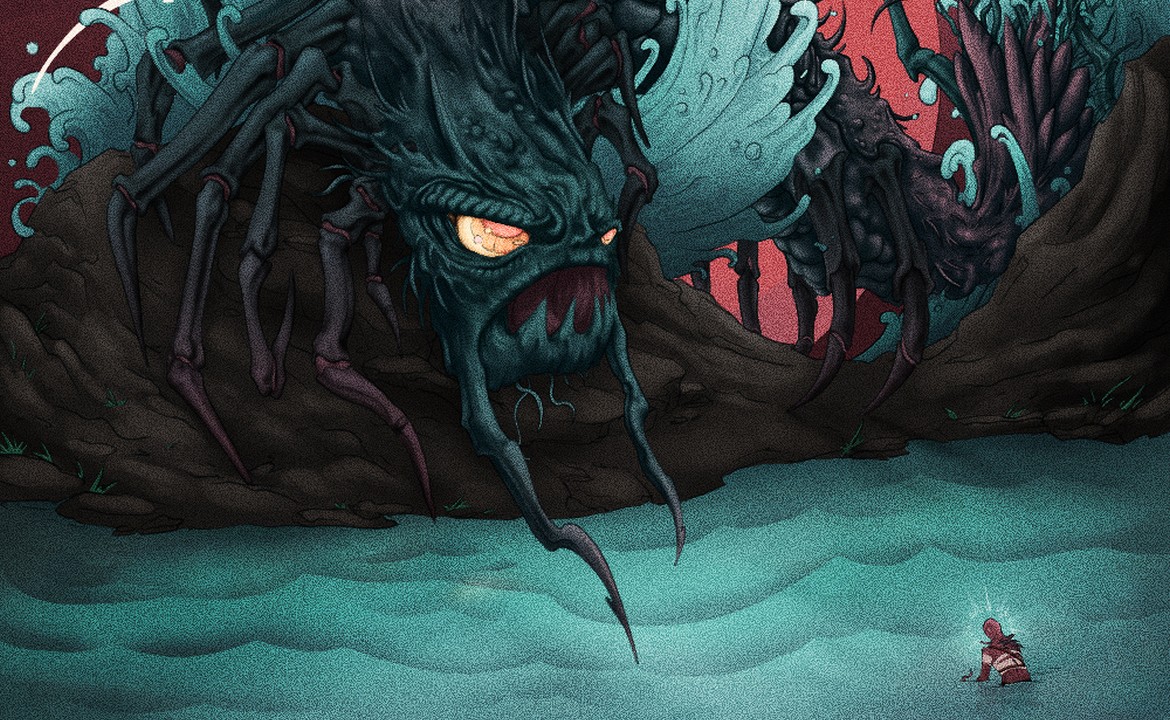“There is a ceaseless noise, ancient and horrendous.”
The idea of music coming in “waves” may be is appealing for chroniclers, but it’s a tad bewildering for the common listener. It’s easy to dismiss as cave-dwelling Wikipedian habit, or the pontification of an over-funded music journalist. However, there is some method to the act of creating cohorts out of the stream of bands that make up a loose art-form. The practical reasoning is that a project’s formative years must be far removed from their true flowering. What launches a musician’s journey is inspiration, and the development and formation of a band or project must follow before the community can observe a serious debut. Zoom out and squint, and you have your wave, so often cited for black metal, post rock, techno, emo, and punk of all kinds.
The waves of tech metal have been defined by the influence of the “djent” sound, prog, groove, mathcore, and the exact extent a band wishes to rip off Meshuggah. Their run of albums from Destroy Erase Improve onward are what the birth of the sound, but it wasn’t until 2010 that the wave peaked – certainly thanks to the proliferation of Line 6 PODs to every furture djent kid’s bedroom. The other early contributors (Textures, SikTh, Fellsilent, Cyclamen and Bulb, to name a few) also made fundamental contributions and developed tech metal into a rich scene, ripe to influence metalcore towards the hyper-precise and heavy form we celebrate it in today. One could go on to chart the way that tech metal went on to evolve, but with Pravitas there’s no need. Listen to The Parasitic Divine and you’ll be able to imagine their members scouring the 2010s internet for polyrhythmic Milton-clean nirvana. This angle on the band isn’t hyperbole – their side gig is Milk & Two Shuggahs, literally the world’s only Meshuggah cover band, which aligns them with that golden era of djent.
Their debut album The Parasitic Divine is all the better for its nature as a throwback. Out of the gate, “A Closed Circuit” greets you with clunky Animals As Leaders self-titled slapping and glassy TesseracT leads. The hooks come in the form of an addictive groove, prominent bass, detailed sound design, and Chris Sellers’ powerful gutterals. The follow up “Delusions of Morality” is less about its atmosphere and more about the fundamentals of tech death. Les Harrison’s drumwork is ridiculously entertaining, and the chorus balances the importance of melody without taking the foot off the gas. Eschewing the boredom of verse two, the band head down to prog town for a sublime bridge featuring both guitar and bass solos from Cynic’s playbook.
Pravitas have stitched together a chimeric identity, with each track on The Parasitic Divine being its own island. “Once There Was Only Dark” discards the low frets chugs and focuses on ridiculous leads and mathcore breaks, something of a Pravitas speciality since their debut EP The Synthetic Peregrination. It reaches peak levity to execute the tech-cowbell moment to end all tech-cowbell moments (for posterity, 1:50). “The Crustacean” is a brilliant execution of pure groove metal, and the speed of “Breakneck” lives up to its name, narrowly beaten by “Hightower” where thrash and even power metal tendencies are allowed in. “Exile” is the most progressively ambitious track, nearing six minutes and incorporating synth lines within the riffs to add some more colour to the record’s mid stretch.
There are brief moments where Sellers dips into somewhat clean vocals, on “Defragment” and “Spear in the Chest”, which ultimately aren’t his forte. The songwriting seem to know this, sticking to territory that is a better match to his articulate harsh vocals. The production is mostly a success – unsurprisingly for tech, the guitars lead the way, while the drum and vocal production have room for additional definition in the future. The record is dense, with some of the most mind-bending and entertaining moments hidden in “The Eye of the World” and the closer-single “Monolith”, so some patience is required to allow it all to sink in.
The way The Parasitic Divine skips a generation is in what it lacks. Pravitas avoid the core-breakdowns, Bring Me-pop tendencies, or monolithic prog structures, whilst keeping the technical playing far away from the Polyphian or Unprocessed tendencies. Pravitas might have mastered Meshuggah’s music through their side project, yet have wisely but have kept their own project completely distinct from the titans themselves. Pravitas have taken their time to inject the best strains of tech’s modern roots into The Parasitic Divine without ill will toward the trends of today. All of its elements cohere naturally and are proficiently delivered, resulting in a joyous throwback record. This is a moment to look back and say, you know what, all those years ago, we were right. Stay tech.
8/10
The Parasitic Divine releases on the 30th March through independent release.

